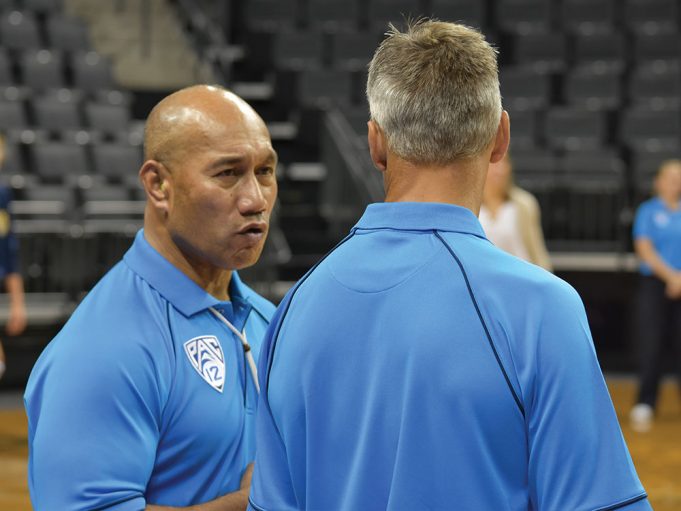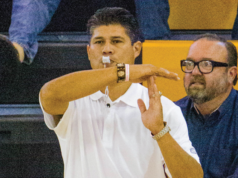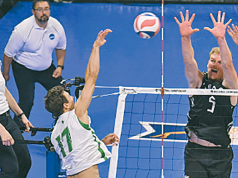One of the best parts about belonging to the cadre of volleyball officials is the chance to be around others who love the game and get their feedback on our work. We want to improve our skills when it comes to administering a fun, fair contest for the players, coaches and fans.
Getting opportunities to officiate a variety of matches is valuable. Experience alone, however, is not enough. We need our partners or other observers to give us feedback about what we are doing well and areas where we need to improve. Giving and receiving feedback are additional skills that we need to develop.
As Judith Martin (otherwise known as Miss Manners) says, “When virtues are pointed out first, flaws seem less insurmountable.” When providing feedback, timing, tact and demeanor are all very important. Adults learn through a variety of methods, but pretty much all of us love to hear praise. Therefore, it is a good communication technique to start by reinforcing your partners’ strengths and applauding their successes.
Determine first if the individual is open to constructive feedback and criticism
But whether you’re in the role of a partner or an observer, you probably also noted some areas for improvement. Timing and tact are crucial. If it is a typical match and not a ratings or review environment, first determine if the individual is even open to constructive criticism.
Take for example a situation where your partner has many more years of experience. If you come out and say, “They told us at the clinic that you should not spend so much time talking to coaches,” that may rub your partner the wrong way. Instead, you may need to politely ask your partner what was included in the interaction with the coach. With luck, you will get the chance to offer a suggestion on wording to cut down the time spent, but maybe the opportunity will have to come later. Either way, it is hoped you also learn something along the way.
When working with a less experienced official, you may see an actual error in their mechanics that needs to be fixed during the match. In between sets might provide time to offer the suggestion. But if you have a suggested technique to help improve, waiting until after the match might be a better time. Perhaps you should even wait until you are one-on-one so you don’t make your partner uncomfortable in front of others. It may also be wise to pick the top three things to work on. Even if you start with the positives, if you go on and on with a list of 10 things they need to improve, that can be very deflating or overwhelming to a newer official. Pick the most important items this time and hopefully you will get a chance to see the improvement in their game in a contest down the road.
Demeanor refers to the attitude, audio tone and body language you present when offering feedback. With the proper demeanor, you’ll come across as a supporter of your partner and they will feel you truly want them to succeed. Do not offer suggestions just to show how smart you are or to belittle the other’s performance. This may seem like common sense, but many officials struggle to develop this skill. You must pay attention to your nonverbal actions, the tone and volume of your voice, along with your choice of wording.
You need to be clear on whether you are offering something defined by rules or mechanics manuals, or just a suggestion based on your experience or preferences. For example, if your partner is using the wrong signal for a situation, be clear on what needs to be fixed. For example, if the ball goes off the block into the antenna, the signal is “out,” not “touch.” But maybe your partner has trouble quickly transitioning as second referee as play swiftly approaches the net. You may offer a footwork suggestion that has worked for you. He or she may try it, but it might not work for his or her height or body type.
Anytime you get the chance to offer feedback, end with a positive and leave your partner looking forward to the next match with you.
Famed UCLA basketball coach John Wooden said, “You can’t let praise or criticism get to you. It’s a weakness to get caught up in either one.” That certainly applies to officials. A good official needs to learn how to handle feedback. Some officials are hard on themselves. Learn how to say thank you when receiving praise. Maybe you are beating yourself up over that double contact you didn’t whistle or that overlap you didn’t recognize soon enough. Don’t allow that to overshadow the nice comments you just received. Be ready to accept the positive words before getting into the areas you need to improve.
The two main skills to develop when receiving feedback are to listen and to learn. Always be willing to ask your partners after the match if they have any suggestions for you. That opens the door for communication and may give you the opportunity to give feedback as well. The important thing is to truly listen to the suggestions, without being overly sensitive. Ask follow-up questions if you are unclear as to the situation. Even if your partner did not read this article and hasn’t yet learned tact or an appropriate demeanor, you may still be able to pick out nuggets that you can incorporate into your game.
Sometimes you may receive information that seems to contradict what you’ve heard previously. Don’t automatically discount that information. Evaluate the comments, since maybe you have over-adjusted to previous feedback. For example, we often see newer second referees allow their eyes to follow the ball and not stay at the net long enough to catch a net or centerline fault. Upon getting that feedback, some second referees totally zone in on the net so completely that they forget to help with back-row attacks or ball handling when the first referee might be screened. So, it is important to listen and process all feedback.
You must fix errors. Go back and review the rulebook for the proper mechanics or the rule itself. You will get many suggestions. Some may work for you and some may not. But always be willing to try suggestions about a different stance, suggestions for language used with coaches and players, or a new aspect of mental preparation. Use a compilation of all the feedback you have received to improve your game.
As a cadre of professionals, we need to remember that constructive feedback helps us all better provide that fun, fair match.
What's Your Call? Leave a Comment:
Note: This article is archival in nature. Rules, interpretations, mechanics, philosophies and other information may or may not be correct for the current year.
This article is the copyright of ©Referee Enterprises, Inc., and may not be republished in whole or in part online, in print or in any capacity without expressed written permission from Referee. The article is made available for educational use by individuals.


















